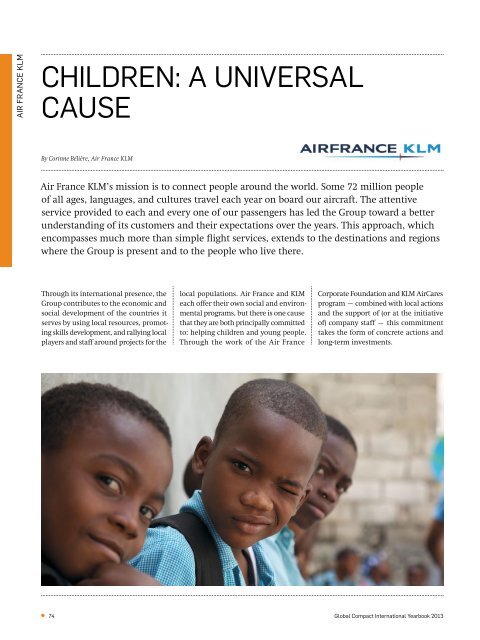Global Compact International Yearbook Ausgabe 2013
The UN Global Compact is the world’s leading platform for corporate sustainability. In describing the future aims of the Global Compact, UN Secretary-General H.E. Ban Ki-moon says: “A growing number of business in all regions recognize the importance of reflecting environmental, social, and economic considerations in their operations and strategies. Now the challenge is to move from incremental process to transformation – in society and markets alike.” The new 2013 edition of the Global Compact International Yearbook offers proactive and in-depth information on key sustainability issues and focuses on recent developments of stakeholder management such as managing corporate legitimacy, for example. Concomitant to this is the call for a more holistic reporting of companies’ financial and nonfinancial performance, which is expressed in the idea of integrated reporting. Furthermore, this edition highlights the connection between the sustainable development of African societies and the ways of managing and governing their natural wealth. The newest developments concerning the move toward a low-carbon economy are shown in the chapter on climate change, which emphasizes the importance of reducing the output of greenhouse gases. Corresponding to the idea of mutual learning, the Global Compact International Yearbook includes 43 good practices of corporate participants that showcase different approaches to the implementation of the Ten Principles of the Global Compact. The Global Compact International Yearbook is a product of the macondo media group and United Nation Publications in cooperation with the Global Compact Office in support of the UN Global Compact and the global advancement of corporate sustainability. It contains 196 pages.
The UN Global Compact is the world’s leading platform for corporate sustainability. In describing the future aims of the Global Compact, UN Secretary-General H.E. Ban Ki-moon says: “A growing number of business in all regions recognize the importance of reflecting environmental, social, and economic considerations in their operations and strategies. Now the challenge is to move from incremental process to transformation – in society and markets alike.”
The new 2013 edition of the Global Compact International Yearbook offers proactive and in-depth information on key sustainability issues and focuses on recent developments of stakeholder management such as managing corporate legitimacy, for example. Concomitant to this is the call for a more holistic reporting of companies’ financial and nonfinancial performance, which is expressed in the idea of integrated reporting. Furthermore, this edition highlights the connection between the sustainable development of African societies and the ways of managing and governing their natural wealth. The newest developments concerning the move toward a low-carbon economy are shown in the chapter on climate change, which emphasizes the importance of reducing the output of greenhouse gases.
Corresponding to the idea of mutual learning, the Global Compact International Yearbook includes 43 good practices of corporate participants that showcase different approaches to the implementation of the Ten Principles of the Global Compact. The Global Compact International Yearbook is a product of the macondo media group and United Nation Publications in cooperation with the Global Compact Office in support of the UN Global Compact and the global advancement of corporate sustainability. It contains 196 pages.
You also want an ePaper? Increase the reach of your titles
YUMPU automatically turns print PDFs into web optimized ePapers that Google loves.
AIR FRANCE KLM<br />
Children: A Universal<br />
Cause<br />
By Corinne Bélière, Air France KLM<br />
Air France KLM’s mission is to connect people around the world. Some 72 million people<br />
of all ages, languages, and cultures travel each year on board our aircraft. The attentive<br />
service provided to each and every one of our passengers has led the Group toward a better<br />
understanding of its customers and their expectations over the years. This approach, which<br />
encompasses much more than simple flight services, extends to the destinations and regions<br />
where the Group is present and to the people who live there.<br />
Through its international presence, the<br />
Group contributes to the economic and<br />
social development of the countries it<br />
serves by using local resources, promoting<br />
skills development, and rallying local<br />
players and staff around projects for the<br />
local populations. Air France and KLM<br />
each offer their own social and environmental<br />
programs, but there is one cause<br />
that they are both principally committed<br />
to: helping children and young people.<br />
Through the work of the Air France<br />
Corporate Foundation and KLM AirCares<br />
program – combined with local actions<br />
and the support of (or at the initiative<br />
of) company staff – this commitment<br />
takes the form of concrete actions and<br />
long-term investments.<br />
74 <strong>Global</strong> <strong>Compact</strong> <strong>International</strong> <strong>Yearbook</strong> <strong>2013</strong>

















